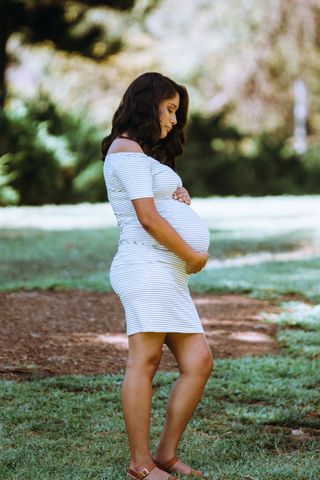Pregnancy
Expecting a Baby...and Body Dissatisfaction?
New research reveals how pregnant women feel about their bodies.
Posted January 23, 2020 Reviewed by Matt Huston

Across a woman’s life, she will experience many changes that can dramatically affect how she thinks and feels about her body. One of these changes in many women’s lives is pregnancy. Researchers at Deakin University in Australia, led by Fuller-Tyszkiewicz and colleagues, investigated how exactly pregnant women’s thoughts and feelings about their bodies compared to those of non-pregnant women.
The research
In the research, 1,245 pregnant women in different trimesters of pregnancy and 547 nonpregnant women completed a series of questionnaires to assess how they think and feel about their bodies.
In a nutshell, the key findings were that pregnant women and nonpregnant women did not differ very much in their overall levels of body dissatisfaction. However, taking a closer look at the individual facets of body dissatisfaction revealed some differences.
Mainly, the pregnant women, especially those in the later phases of pregnancy, felt more dissatisfied with their body weight compared to the nonpregnant women. Yet bodyweight was a main source of body dissatisfaction for both groups of women. Interestingly, the pregnant women were happier when it came to some other aspects of their body, including their chest, shoulders, and calves.
The take-home message
Body dissatisfaction among both pregnant and nonpregnant women is characterized by dissatisfaction with body weight. But pregnant women feel even more dissatisfied with their body weight than nonpregnant women do. This makes sense when looking at the broader culture we live in, where thinness is viewed as important and beautiful. Pregnancy takes women further from this “ideal,” because their body must gain weight to support their baby and the pregnancy.
Even though the pregnant women felt less satisfied with their body weight, they felt more satisfied with certain body areas, such as their chest. Again, these changes can be understood by looking at our society’s beauty standards, where having larger breasts is seen as beautiful. In this respect, pregnancy can take women’s bodies closer to the “ideal.”
The results of this study underscore that, sadly, women remain influenced by societal beauty standards and judge their own changing body against these standards (body weight, chest size, etc.), even when pregnant. What are women to do, then?
Despite experiencing body dissatisfaction during pregnancy, some studies show that many women also develop new, positive feelings toward their bodies. For example, women might draw strength from focusing on their body’s ability to create new life and eventually breastfeed and provide a space of comfort to their baby.
Some pretty amazing body image programmes for pregnant women and new moms are developing around these ideas, such as Body Confident Mums in Australia. These programmes are invaluable, especially considering that mothers are one of the most important influences on how children will think and feel about their own bodies in childhood and later in life.
References
Fuller-Tyszkiewicz, M., Broadbent, J., Richardson, B., Watson, B., Klas, A., & Skouteris, H. (2019). A network analysis comparison of central determinants of body dissatisfaction among pregnant and non-pregnant women. Body Image, 16, 111-120.
Fox, B., & Neiterman, E. (2015). Embodied motherhood: Women’s feelings about their postpartum bodies. Gender & Society, 29, 670-693.


